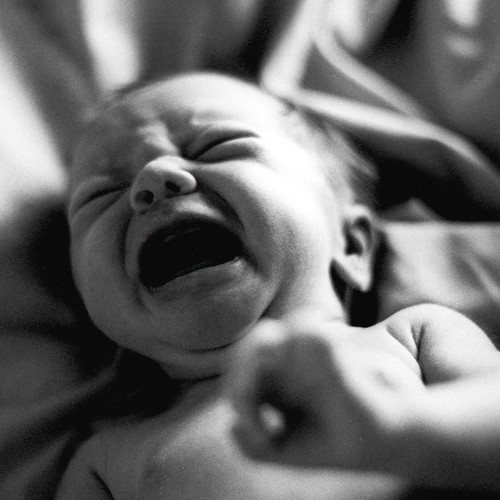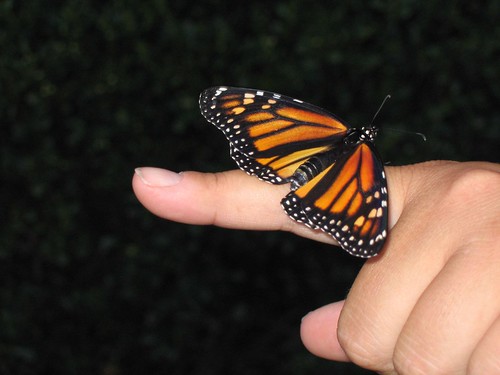Emma writes: “I really struggle with a particular issue at meal times with my 11 month old son. He is awesome with washing hands, but pulls away, pulls at the cloth, and tries with all his might to throw it on the floor when I wipe his face. I’ve tried slowing down. I always tell him what I am going to do before I do it, and I have tried offering the cloth to him. (He throws it as far away as possible, every time.) How do you do it???”
Communication, conversation, turn taking, cooperation, independence, and self mastery all develop through the everyday care routines (feeding, nose wiping, diaper changing, bathing, etc. ) we engage in with our infants and toddlers.
Emma, I think you just have to keep trying, remain calm and consistent, and trust that one day your son is going to understand and choose to participate and cooperate more. If you go very slowly, stay calm, and keep talking him through the process while asking and waiting for his participation and cooperation, it will get easier one day.
Maybe it will help you to know that not everything always goes so smoothly around here. For instance, when R was about 11 months old, she decided that she absolutely did not want anything at all to do with diaper changing. She would crawl over to her diaper changing area when I noted it was time for a change, but it was all downhill from there. Once she got to the changing pad, she would not stay still. She would not stay on her back for even the two minutes it took me to fasten her diaper. She spent every diaper change trying to escape, grabbing at the wipes and the diaper, trying to kick me, bucking her body, and yelling at me in protest.
For my part, I started to dread diaper changes. I did them as infrequently as possible. I found myself asking, then pleading for, and finally demanding cooperation. (Demanding didn’t work so well.) I tried everything I knew how to do. Slowing down. Talking with her. Asking for her permission and participation. Letting her roll and play. I tried to do as much of the diaper change as I could while she was on her tummy. I tried singing silly songs.
Each time, it would go like this: She’d roll onto her tummy and try to escape. I’d wait a minute, and try to involve her in the task at hand. I would hand her the diaper to hold, and she’d drop it on the floor and laugh. I’d hand her the box of wipes, wait for her to pull one out, and ask her to hand it to me, and she’d drop it on the floor and laugh. I’d ask her to turn on her back after letting her roll around for 3 minutes, and I knew she understood, because she’d get very still, then turn on her back, give a grin, and flip right back onto her tummy again. I’d try, in vain, to encourage her to help me dress her, by asking her to push her limbs through the holes of her clothing, and she’d squirm away and flail. I could feel myself growing impatient and my blood pressure rising.
One day, when poop was flying everywhere, my patience was short, and asking her to stay still wasn’t working, I insisted she had to stay still, and I “helped” her by placing one arm across her body so she couldn’t roll. This didn’t feel good to me, and for her part, she let me know how she felt about being restrained by literally growling at me!
It wasn’t easy, and it wasn’t fun for me, but as much as she complained and protested during the diaper change, she’d go back to happily playing and babbling once it was all over, while I was left feeling frustrated, cleaning up poop from every surface, wondering what I was doing wrong, and thinking, “There’s got to be an easier way.” I found myself looking on-line at those diaper changing devices that “gently restrain” babies, and promise easy, mess free diaper changing. (Yes, I did!!!) I had to laugh at myself, because after all, here I was, supposedly one of the diaper changing queens of the baby world!
What happened? Our diaper changing times used to be such wonderful times of connection and closeness, and now, almost every time, it was miserable for both of us. What happened was that my girl was maturing into a young toddler. She was mobile and also asserting her will and personality. She was asking me to engage with her on her terms, as much as I was asking her to engage on mine. This (as I’d counseled many a parent in the past) was a good and positive sign of the trust she had developed in me to listen to her, and to do things with her, instead of for her or to her. As much as it was my job to gently bring her back to the task at hand, it was also my job to follow her lead a bit, and find a way to make room for, and enjoy her emerging playfulness and need to be in constant motion.
I re-read Janet Lansbury’s post,, Dealing With Diaper Changing Disasters, and Mamas In The Making post, Catch Me If You Can.
Finally, it dawned on me that maybe my attitude and approach needed to change if it was going to get any better. I had begun to look at diaper changing time as a “problem” to be solved instead of an opportunity to build communication, cooperation, and connection. I just wanted to get the chore done. I anticipated that it was going to be a disaster, and more often than not it was. I also realized that I wanted R to listen to me, and participate, but on my terms and timeline. I forgot that what she was doing was crucial, and an important part of her learning process.
How often had I counseled other parents to try to relax, step back a little, and re-frame the issue (whatever it was)? It was time to take my own advice. I needed to adjust my attitude and expectations. “This isn’t a problem. It is an opportunity. This is just what’s happening right now. It’s part of the process of growth and learning. We’ve got to find a way to do it together.”
Amazingly enough, as soon as I stopped approaching the diaper changing time as a dreaded task to be gotten through, and tried to see it as a time to build connection, cooperation and communication, it got better and easier. R was suddenly more willing and able to cooperate. And then tonight, there was this, during another caregiving time:
I was wiping R’s face with a washcloth after dinner. She was grabbing at the cloth, and pushing my hand away. I said, “Would you like to hold the cloth and try by yourself?” while holding the cloth out to her with an open palm. She took the cloth and swiped at her face, then she reached out and handed the cloth back to me. I said, “Thank you!” She laughed, and reached for the cloth again, so I handed it back to her. We then spent the next ten minutes handing the cloth back and forth to each other. Each time she handed me the cloth, I said, “Thank you!” and she gave a delighted grin and belly laugh before reaching out to ask for the cloth again. This was one of the best conversations I’ve ever had, bar none.
Emma, I know that it’s not always easy, but try to trust that together with your son you will get to where you want to be (eventually). Try to look at the struggles as opportunities instead of problems. Remember that this is all a part of the process, and the building of a relationship and conversation that will last a lifetime. It takes time. Try to remember to slow down, and don’t forget to laugh when you can. Because the alternative is frustration for both of you, and who needs that? I promise you, if you stick with it, there will come a day (and soon), when you will experience the joy of a reciprocal conversation with your boy, much like the one I had with R the other night, and I’d love to hear about it when it happens!



